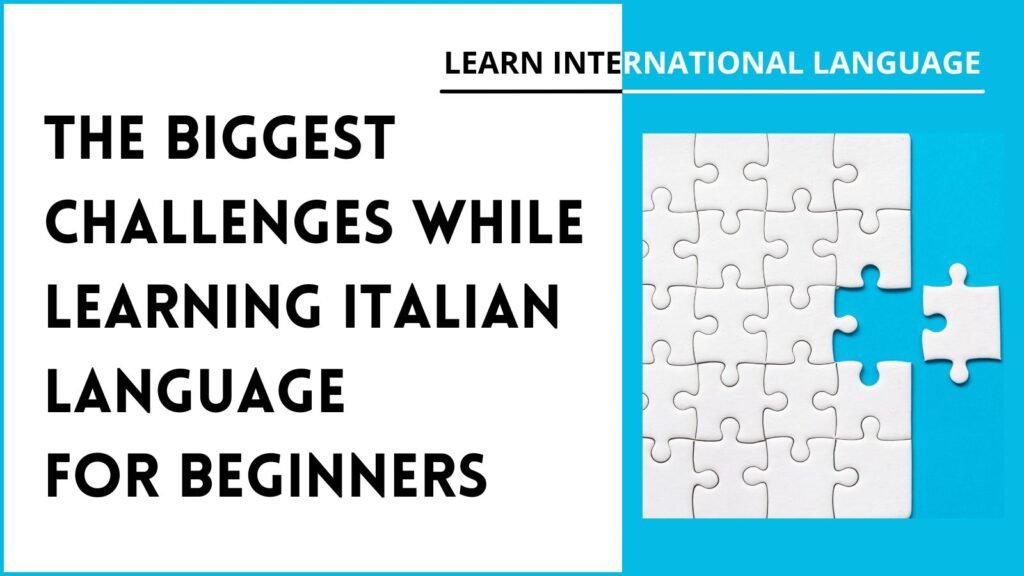Are you eager to learn the Italian language but don’t know where to start? Whether you’re preparing for a trip to Italy, interested in learning a new language, or simply passionate about Italian culture, this guide is for you. Italian is one of the most beautiful and expressive languages, and learning it with the right approach can be both fun and rewarding. Let’s explore effective strategies and resources to help you get started with learning the Italian language for beginners!
Get in touch with us for personalized guidance on your Italian language journey! Contact us here.
Why Learn Italian as a Beginner?
Italian is not only the language of art, music, and history but also opens doors to a wealth of culture, food, and travel experiences. As a beginner, learning Italian offers several benefits:
- Cultural Connection: Connect with Italian history, opera, cinema, and art like never before.
- Travel Convenience: Enjoy a richer experience while traveling to Italy, speaking with locals and understanding the culture.
- Cognitive Benefits: Learning a new language enhances brain function and cognitive skills.
- Career Opportunities: Italian can boost your career, especially if you work in international business, hospitality, or tourism.
Steps to Start Learning Italian
1. Learn Basic Italian Vocabulary and Phrases
As a beginner, the best way to start is by learning essential vocabulary and common phrases. Simple greetings, numbers, and everyday words will allow you to communicate in Italian almost immediately. Here are a few phrases to get you started:
- Ciao! (Hello!)
- Come stai? (How are you?)
- Grazie! (Thank you!)
- Dove si trova il bagno? (Where is the bathroom?)
2. Master Italian Pronunciation
Italian pronunciation is relatively straightforward, but it’s important to get the basics right from the start. Focus on the sounds of Italian vowels and consonants, as they differ from English in some key ways.
- Vowels: Italian vowels are always pronounced clearly, and each vowel has a distinct sound.
- Consonants: Pay attention to consonant sounds such as “c” and “g” that change depending on the vowels that follow.
Need help with pronunciation? Visit us to get expert tips and resources! Contact us here.
3. Learn Italian Grammar Basics
Italian grammar has a few rules that can be tricky for beginners, but don’t worry—start with the basics, and build your way up. Key points to focus on include:
- Nouns and Gender: Italian nouns are either masculine or feminine, affecting the form of articles and adjectives.
- Verbs and Conjugation: Learn the three types of verb conjugation (-are, -ere, -ire) and how to conjugate them in the present tense.
- Sentence Structure: Italian sentences follow a subject-verb-object structure, just like English.
4. Practice Listening and Speaking
One of the most effective ways to learn a language is through listening and speaking. Practice listening to Italian music, watching Italian movies with subtitles, and repeating phrases aloud. Use language apps and language exchange platforms to practice speaking with native speakers.
5. Immersive Learning Methods
Surrounding yourself with the Italian language as much as possible will accelerate your learning. You can:
- Join Italian language groups or clubs.
- Take Italian language classes, either in-person or online.
- Use language apps such as Duolingo, Babbel, or Memrise to reinforce your learning.
Still unsure about how to proceed? Get in touch with us for personalized learning advice! Contact us here.
Common Mistakes to Avoid as a Beginner
When learning Italian, beginners often make a few common mistakes. Here’s a quick list of things to watch out for:
- Overcomplicating Grammar: Don’t stress too much about grammar at the beginning. Focus on communication first, and refine grammar as you progress.
- Skipping Pronunciation Practice: Good pronunciation is essential. Don’t skip it, even if you’re more focused on learning vocabulary.
- Not Practicing Regularly: Language learning is a gradual process. Be consistent and practice daily, even if it’s for a few minutes.
- Avoiding Mistakes: Mistakes are part of learning a new language. Don’t be afraid to speak and practice, even if you make errors.
Summary: Begin Your Italian Language Journey Today!
Learning Italian as a beginner can be a highly rewarding experience. Start with basic vocabulary, practice your pronunciation, and gradually build up your grammar skills. With patience and dedication, you’ll find yourself becoming fluent in Italian before you know it.
If you’re ready to take the next step, we’re here to help you with personalized language learning resources. Contact us today for tailored guidance on how to learn Italian effectively!
Want more guidance on learning Italian? Contact us here.
FAQs About Learning Italian
1. How long does it take to learn Italian for beginners?
It depends on how much time you dedicate to learning. On average, it may take 3-6 months to feel comfortable with basic conversations, but fluency can take 1-2 years.
2. What are the best apps to learn Italian for beginners?
Popular language apps like Duolingo, Babbel, and Memrise offer structured courses for beginners. Each focuses on vocabulary, grammar, and pronunciation.
3. Is it hard to learn Italian if I speak English?
Italian is a Romance language, so it shares many similarities with English, such as a large number of loanwords. This makes learning easier for English speakers compared to other languages.
4. Do I need to learn Italian grammar right away?
Grammar is important, but don’t let it overwhelm you at the start. Focus on building basic vocabulary and speaking skills, then gradually incorporate grammar lessons.
5. How can I practice speaking Italian?
You can practice speaking through language exchange platforms, Italian-speaking groups, or by speaking with native speakers. The more you practice, the better you’ll get!
By focusing on these strategies and using the resources available, you can kickstart your Italian language learning journey today. Don’t hesitate to reach out to us for expert advice and personalized learning plans!
Have more questions? Reach out to us here for expert guidance.

